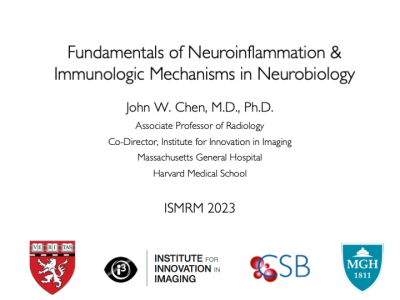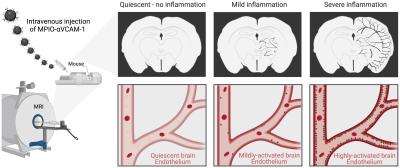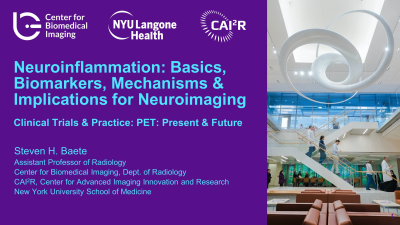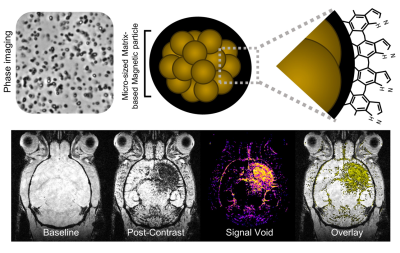Weekend Course
Neuroinflammation: Basics, Biomarkers, Mechanisms & Implications for Neuroimaging
ISMRM & ISMRT Annual Meeting & Exhibition • 03-08 June 2023 • Toronto, ON, Canada

| 07:45 |
 |
Fundamentals of Neuroinflammation & Immunologic Mechanisms in
Neurobiology
John Chen
Keywords: Neuro: Nervous system, Neuro: Neurodegeneration, Neuro: Brain Neuroinflammation is a key immune response observed in many neurological and neurodegenerative diseases. While an appropriate immune response can be beneficial, aberrant activation of this response recruits excessive proinflammatory cells to cause damage. Thus, neuroinflammation can exert damaging as well as beneficial effects depending on the context. This talk will provide a broad overview of neuroinflammation and describe its unique aspects. Key immune cells and factors in mediating neuroinflammation will be introduced followed by a discussion of clinical and emerging biomarkers for neuroinflammation, including an imaging method to differentiate damaging and reparative neuroinflammatory responses in vivo by MRI. |
| 08:15 | Inflammatory Basis of Neurological Diseases I: Autoimmune & Primary Inflammatory/Infectious Disorders Pascal Sati | |
| 08:45 |
 |
Inflammatory Basis of Neurological Diseases II: Cerebrovascular,
Neurodegenerative & Neuropsychiatric Disorders
Sara Martinez de Lizarrondo
Keywords: Neuro: Cerebrovascular, Cross-organ: Inflammation, Contrast mechanisms: Molecular imaging Inflammation is a hallmark of most neurological disorders. Following perturbation of the homeostasis of the central nervous system, both innate and adaptive immune systems are at play to limit the extent of diseases and mediate repair and regeneration. Yet, abnormal activation of the immune system in the brain can worsen brain damages and influence cognitive functions. The pathophysiological mechanisms driving neuroinflammation in the context of cerebrovascular, neurodegenerative, and neuropsychiatric disorders are similar and offer interesting biomarkers for imaging. |
| 09:15 |
Break & Meet the Teachers |
|
| 09:45 |
 |
Clinical Trials & Practice: PET: Present & Future
Steven Baete
Keywords: Neuro: Brain Receptor PET imaging allows for unparalleled insights in the physiological and metabolic processes of neuroinflammation. PET radioligands targeting TSPO are the most developed and their utility has been shown in literature in a wide range of neurodegenerative and psychiatric diseases. More recently, a number of promising PET radioligands for alternative inflammation targets are being developed. When interpreting receptor PET imaging, caution is needed in carefully considering appropriate modeling approaches and distribution and expression of target receptors in the pathology of interest. |
| 10:15 |
 |
Clinical Trials & Practice: MRI: Present & Future
Maxime Gauberti
Keywords: Contrast mechanisms: Molecular Imaging MRI of neuroinflammation currently relies on two main imaging features: edema and blood brain barrier leakage. Unfortunately, they are not specific for inflammation and the diagnosis of inflammatory lesions of the central nervous system can be challenging. New imaging biomarkers have been described such as the paramagnetic rim sign in multiple sclerosis, that improve imaging specificity but remain only applicable to a subset of neuroinflammatory diseases. More recently, there have been striking progresses in preclinical molecular MRI including the development of highly sensitive and specific contrast agents targeting the inflamed neurovascular unit with potential for clinical translation. |
| 10:45 |
Panel Discussion |
|
| 11:15 |
Break & Meet the Teachers |
The International Society for Magnetic Resonance in Medicine is accredited by the Accreditation Council for Continuing Medical Education to provide continuing medical education for physicians.